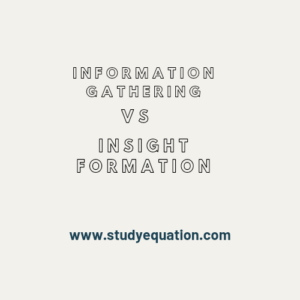
Information gathering and insight formation are very different concepts. Getting information and data is the process of information collection. It speaks about knowledge that has been obtained through conversation regarding certain events or conditions. So, how do you distinguish between information gathering and insight formation? Insight is the capacity to recognize the reality of a circumstance. Insight formation depicts how a person views the world after fully understanding a subject. As a result, based on everyone’s concepts and viewpoints, it may differ from person to person.

What is information gathering?
Information gathering refers to the simple art of collecting valuable information in order to analyze, optimize and necessitate action. For example, our five sensory organs are used for gathering data, which is either internal or external and for our mind to analyze and keep the body in an optimum state. This is an example of information gathering. This principle is valuable for various institutions and sectors alike.
Why is information gathering important?
Information gathering entails basic data for any situation. Imagine if you were to build a house. Firstly, you would need to ascertain if the soil upon which one will build is strong enough or not. Secondly, you should check if the proposed model will be sturdy against external factors. This is a part of information gathering and is essential for analysis for the next phase.

What is insight formation?
In layman’s terms, our brains constantly take in information and work to make the best possible use of it, and this is how insight grows. This is because of the way modern humans digest information, and when a task or problem is presented, a solution will appear unique to each individual. To know more about insight, you can click here.
Why is insight formation important?
Insight formation gives us an essential idea of how and why results are portrayed and relay positive feedback for the next similar action. Thus, it helps evolve from various situations. Insight formation is an integral part of human civilization, because it helps determine future situations which have not yet occurred.
So, how do you distinguish between information gathering and insight formation?
Simply, information gathering leaves little to no room for reasoning, while insight formation gives clarity for actions. While information gathering requires loads of data for any situation, insight formation relies on past experience, thinking abilities and analytical skills to be able to cater to the situation.
In schools, we are generally taught to cram subjects such as history, which is essentially information gathering. This leaves the students with minimal interest since rote learning keeps us away from using our reasoning abilities. Learning with a proper understanding of the subjects helps one draw conclusions, or spark a debate with conflicting ideas, and make the subject interesting.
This is how to distinguish between information gathering and insight formation.
You may also read: Mother’s Day Summary Class 11th
Frequently Asked Questions about Albert Einstein at School
Define information gathering
Define insight formation
Is information gathering different from insight formation? How?
How do you distinguish between information gathering and insight formation? Categorization and rationalization are two important pillars of insight formation. These two pillars are quintessential in determining an estimation of a situation. Whereas information gathering is all about data and assumes no means to draw estimations.

Other Questions & Answers of Albert Einstein at School
The school system often curbs individual talents. Discuss.
• The focus is primarily on memorization of facts and data, rather than teaching students to comprehend concepts and ideas.
• The focus is more on passing examinations than helping students grow intellectually and mentally.
• The fluctuating student-teacher ratio makes it impossible for the teachers to offer each student their undivided attention.
• Less time is spent alone with children these days.